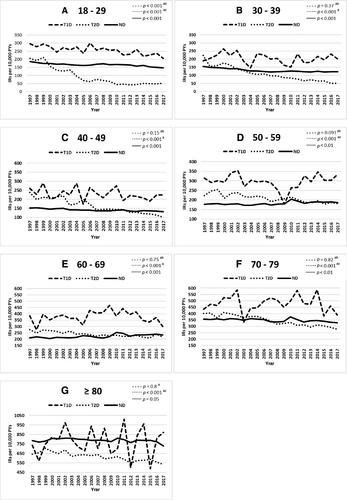Mohamad I Nasser, Annika Vestergaard Kvist, Peter Vestergaard, Richard Eastell, Andrea M Burden, Morten Frost
{"title":"Sex- and Age Group-Specific Fracture Incidence Rates Trends for Type 1 and 2 Diabetes Mellitus","authors":"Mohamad I Nasser, Annika Vestergaard Kvist, Peter Vestergaard, Richard Eastell, Andrea M Burden, Morten Frost","doi":"10.1002/jbm4.10836","DOIUrl":null,"url":null,"abstract":"<p>The incidence of major osteoporotic fractures has declined in men and women in Western countries over the last two decades. Although fracture risk is higher in persons with diabetes mellitus, trends of fractures remain unknown in men and women with diabetes. We investigated the trends in fracture incidence rates (IRs) in men and women with type 1 diabetes mellitus (T1D) and type 2 diabetes mellitus (T2D) in Denmark between 1997 and 2017. We identified men and women aged 18+ years who sustained a fracture (excluding skull and facial fractures) between 1997 and 2017 using the Danish National Patient Registry. We calculated sex-specific IRs of fractures per 10,000 person-years separately in persons with T1D, T2D, or without diabetes. Furthermore, we compared median IRs of the first 5 years (1997–2002) to the median IRs of the last 5 years (2012–2017). We identified 1,235,628 persons with fractures including 4863 (43.6% women) with T1D, 65,366 (57.5% women) with T2D, and 1,165,399 (54.1% women) without diabetes. The median IRs of fractures declined 20.2%, 19.9%, and 7.8% in men with T1D, T2D, and without diabetes, respectively (<i>p</i>-trend <0.05). The median IRs decreased 6.4% in women with T1D (<i>p</i>-trend = 0.35) and 25.6% in women with T2D (<i>p</i>-trend <0.05) but increased 2.3% in women without diabetes (<i>p</i>-trend = 0.08). Fracture IRs decreased in men with both diabetes types and only in women with T2D, highlighting the need for further attention behind the stable trend observed in women with T1D. © 2023 The Authors. <i>JBMR Plus</i> published by Wiley Periodicals LLC on behalf of American Society for Bone and Mineral Research.</p>","PeriodicalId":14611,"journal":{"name":"JBMR Plus","volume":"7 11","pages":""},"PeriodicalIF":3.4000,"publicationDate":"2023-10-27","publicationTypes":"Journal Article","fieldsOfStudy":null,"isOpenAccess":false,"openAccessPdf":"https://asbmr.onlinelibrary.wiley.com/doi/epdf/10.1002/jbm4.10836","citationCount":"0","resultStr":null,"platform":"Semanticscholar","paperid":null,"PeriodicalName":"JBMR Plus","FirstCategoryId":"1085","ListUrlMain":"https://onlinelibrary.wiley.com/doi/10.1002/jbm4.10836","RegionNum":0,"RegionCategory":null,"ArticlePicture":[],"TitleCN":null,"AbstractTextCN":null,"PMCID":null,"EPubDate":"","PubModel":"","JCR":"Q2","JCRName":"ENDOCRINOLOGY & METABOLISM","Score":null,"Total":0}
引用次数: 0
Abstract
The incidence of major osteoporotic fractures has declined in men and women in Western countries over the last two decades. Although fracture risk is higher in persons with diabetes mellitus, trends of fractures remain unknown in men and women with diabetes. We investigated the trends in fracture incidence rates (IRs) in men and women with type 1 diabetes mellitus (T1D) and type 2 diabetes mellitus (T2D) in Denmark between 1997 and 2017. We identified men and women aged 18+ years who sustained a fracture (excluding skull and facial fractures) between 1997 and 2017 using the Danish National Patient Registry. We calculated sex-specific IRs of fractures per 10,000 person-years separately in persons with T1D, T2D, or without diabetes. Furthermore, we compared median IRs of the first 5 years (1997–2002) to the median IRs of the last 5 years (2012–2017). We identified 1,235,628 persons with fractures including 4863 (43.6% women) with T1D, 65,366 (57.5% women) with T2D, and 1,165,399 (54.1% women) without diabetes. The median IRs of fractures declined 20.2%, 19.9%, and 7.8% in men with T1D, T2D, and without diabetes, respectively (p-trend <0.05). The median IRs decreased 6.4% in women with T1D (p-trend = 0.35) and 25.6% in women with T2D (p-trend <0.05) but increased 2.3% in women without diabetes (p-trend = 0.08). Fracture IRs decreased in men with both diabetes types and only in women with T2D, highlighting the need for further attention behind the stable trend observed in women with T1D. © 2023 The Authors. JBMR Plus published by Wiley Periodicals LLC on behalf of American Society for Bone and Mineral Research.

1型和2型糖尿病的性别和年龄组骨折发生率趋势
在过去的二十年里,西方国家的男性和女性骨质疏松性骨折的发生率都有所下降。虽然糖尿病患者的骨折风险较高,但男性和女性糖尿病患者的骨折趋势尚不清楚。我们调查了1997年至2017年丹麦男性和女性1型糖尿病(T1D)和2型糖尿病(T2D)患者骨折发生率(IRs)的趋势。我们使用丹麦国家患者登记处的数据,确定了1997年至2017年期间发生骨折(不包括颅骨和面部骨折)的18岁以上男性和女性。我们分别计算了T1D、T2D和非糖尿病患者每10000人年骨折的性别特异性ir。此外,我们比较了前5年(1997-2002年)和后5年(2012-2017年)的中位数IRs。我们确定了1,235,628例骨折患者,包括4863例(43.6%女性)T1D, 65,366例(57.5%女性)T2D和1,165,399例(54.1%女性)无糖尿病。男性T1D、T2D和非糖尿病患者骨折的中位IRs分别下降20.2%、19.9%和7.8% (p-trend <0.05)。T1D女性的中位IRs下降6.4% (p-trend = 0.35), T2D女性的中位IRs下降25.6% (p-trend <0.05),而非糖尿病女性的中位IRs增加2.3% (p-trend = 0.08)。两种糖尿病类型的男性患者骨折发生率均下降,仅T2D女性患者骨折发生率下降,这表明在T1D女性患者中观察到的稳定趋势背后需要进一步关注。©2023作者。JBMR Plus由Wiley期刊有限责任公司代表美国骨骼和矿物研究协会出版。
本文章由计算机程序翻译,如有差异,请以英文原文为准。


 求助内容:
求助内容: 应助结果提醒方式:
应助结果提醒方式:


